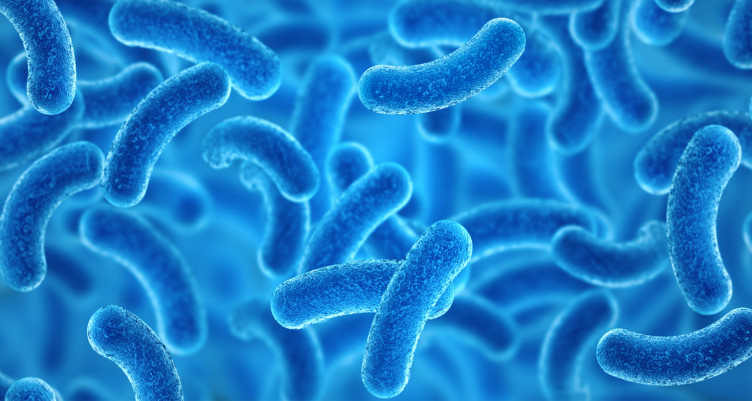Move Over Probiotics. Synbiotics Are the Gut Supplement You Need

- Probiotics and prebiotics benefit your body by helping your immune system, your moods, and the lining of your gut.
- Probiotics are the organisms in your digestive tract that benefit you.
- Prebiotics feed those organisms so they can flourish and take the place of harmful strains.
- Synbiotics combine probiotics and prebiotics to magnify the beneficial effects of friendly microorganisms and help them thrive, so they can in turn make nutrients and protective compounds that help you thrive.
You’ve heard of probiotics — the gut-boosting microorganisms found in yogurt, kefir, sauerkraut and other fermented foods. Probiotics are also another name for the beneficial bacteria found in your digestive tract. You may also know about prebiotics, a type of fiber in foods like asparagus and artichokes that feed those healthy organisms.
What you probably haven’t heard of, though, are synbiotics — supplements that contain both probiotics and prebiotics, and they’re destined to be the next big thing in gut health. Synbiotics help deliver probiotics to your gut intact by giving those gut-nourishing bacteria the fuel they need to flourish. That’s important, because research suggests that probiotics don’t always survive the trip.[1] Read on to learn about this buzzy new -biotic, and how it could be the answer to an ailing gut.
What does your gut microbiome do?
You have close to 100 trillion cells living in your digestive system, which form your gut microbiome. Your digestive tract houses a diverse variety of bacteria, yeasts and viruses that benefit you when in balance, or cause inflammation and disease when a few strains are allowed to take over.
To keep you running on all cylinders, your gut microbiome has to have the right bacteria and fungi in the right amounts. The right microorganisms help to keep your immune system in working order and the lining of your gut to stay intact.
The wrong ones weaken your immune system and damage your membranes, which can lead to autoimmune reactions to undigested foods. Since a large portion of your neurotransmitters are made in the gut, these imbalances can also affect your mood and personality.[2]
When your gut bacteria is not in healthy proportions, it can affect your health negatively. In fact, an imbalance of gut bacteria is linked to conditions as diverse as diabetes, obesity, depression, eczema, and irritable bowel syndrome (IBS).[3][4]
Keep reading to find out how you can make sure you have a solid population of the good guys, and create an environment where they can flourish.
RELATED: Signs Your Gut is Unhealthy and Why You Should Fix It
Probiotics vs. prebiotics vs. synbiotics: what’s the difference?
What is a probiotic?

Probiotics are supplements, usually in the form of a powder or capsule, that contain live microorganisms that contribute to a beneficial flora in the digestive tract. [5] There are also probiotic foods, usually fermented foods (think kimchi, kombucha, yogurt, and kefir), that contain these beneficial microorganisms.
The most common probiotics you’ll find in supplements are strains of:
- Lactobacillus
- Bifidobacterium
- Enterococcus
- Saccharomyces boulardii
What are prebiotics?

Prebiotics are carbohydrates that people can’t digest (aka fiber). They reach your colon intact and feed many strains of beneficial bacteria in your gut, without feeding harmful microorganisms.
All prebiotics are fiber, but not all types of fiber are prebiotics. To be a prebiotic, a fiber has to meet three requirements:[6]
- The fiber must remain unchanged in the presence of stomach acid and digestive enzymes
- Microorganisms in the intestines must be able to ferment them
- The strains of bacteria and fungi that feed off these fibers must benefit their host (that’s us)
There are several types of prebiotics, each feeding different species of gut bacteria. Some of the most studied prebiotics include:
- Fructooligosaccharide (FOS), found in onions, chicory, garlic, asparagus, and Jerusalem artichokes[7]
- Galactooligosaccharide (GOS), from breast milk[8] and cruciferous vegetables
- Xylooligosaccharides (XOS), found in raw honey, xylitol, and bamboo shoots[9]
- Inulin, found in bananas, chicory, and jerusalem artichoke[10][11]
- Resistant starch, found in potato starch, cooked and cooled rice, green banana and other sources[12]
For a simple way to get prebiotics in your diet, reach for Bulletproof InnerFuel Prebiotic. It’s an easy add-in to smoothies, coffee or your favorite beverage. Want prebiotics, plus probiotics and collagen protein? Go with Bulletproof Gut Health Collagen Protein.
The benefits of resistant starch
One prebiotic fiber, resistant starch, shows distinct health benefits that make it worth incorporating into your diet — even when you follow a low-carb or keto regimen. The “resistant” part is that it resists digestion and makes it all the way to the lower intestine where friendly microorganisms are waiting to party. There, friendly bacteria and fungi break them down and not only proliferate, but make things like nutrients and protective barriers for our bodies that are otherwise hard to get.
Research about resistant starch is worth paying attention to. It has a long list of benefits, like:
- It may help with insulin sensitivity.[13]
- It supports healthier insulin and glucose levels after meals.[14]
- It can be utilized to make butyrate,[15] which is awesome because butyrate helps with oxidative stress, strong intestinal membranes, and digestion, among other beneficial functions.
Resistant starch is something you want to incorporate into your diet, but the benefits are only as strong as the colony of microorganisms that consume them. It’s not enough that they’re there. The good bugs have to consume them and convert them into beneficial compounds for you to reap a benefit.
That’s where synbiotics come into play.
What are synbiotics?

Before getting into what synbiotics do, it’s helpful to understand why probiotics or prebiotics alone might not get the job done.
If you take a probiotic, the organisms you swallow might run into a couple problems. One, if you have an overgrowth of a few harmful strains, that little bit in your capsule is up against armies of bad bugs. They’re not likely to take root if a few harmful strains already have a stake in the ground.
Second, the probiotic organisms might not have anything to eat once they travel down into your lower digestive tract, and they won’t thrive.
If you take prebiotics, you might not have a strong population of the good guys to take advantage of the buffet table.
Synbiotic supplements solve the problem by offering the best of both worlds. Synbiotics contain both probiotics — friendly microorganisms — combined with prebiotics — food for friendly microorganisms — that is tailored specifically to the strains in the supplement. The result is a stronger population of friendly microorganisms. The name synbiotic is a fusion of synergy and biotic, which loosely translates to working better together to promote life.
For example, it’s beneficial to support bifidobacterium strains with FOS and GOS. Your lactobacillus bugs can get a boost with inulin and GOS.[16] Specific prebiotics feed specific microbial strains.
How to take probiotics and prebiotics for a synbiotic effect
For a strong microbiome, the right microbes must make it into your digestive system, and then you have to feed them. You can do this three ways.

1. Eat enough vegetables to stuff a cow. When you eat a good amount and a wide variety of filling green veggies, you feed the good guys in your gut, which allows them to win out over more harmful flora. Choose predominantly from the green zone veggies on the Bulletproof Diet Roadmap, and aim for several different types of veggies per day.
Foods that are naturally high in prebiotic fibers are:[17]
- Leeks
- Asparagus
- Chicory
- Jerusalem artichokes
- Onions
- Dandelion greens
- Konjac root, which tastes best as shirataki noodles. Try this Low Carb Pad Thai recipe
- Cocoa (yes, please)
- Seaweed – source it from clean waters
The key is variety. For a diverse ecosystem in your gut, aim for a wide array of in-season veggies every day so that all of the good bugs have a chance to eat what they like.

2. Take low-histamine probiotics and pair them with complementary prebiotics.[18] Look for low-histamine producing strains, and consume them alongside their favorite foods. Some examples:
- Lactobacillus rhamnosus and lactobacillus plantarum, paired with inulin and GOS (bananas, chicory, jerusalem artichoke, and cruciferous vegetables)
- Bifidobacterium infantis (found in breast milk) and Bifidobacterium longum paired with FOS and GOS (onions, chicory, garlic, asparagus, Jerusalem artichokes, and cruciferous vegetables)

3. Get synbiotics in supplement form. Look for probiotics that also contain a synergistic prebiotic. It’s a one-stop shop to a strong microbiome.
It’s a good idea to double-check what the company combines. Keep in mind that more strains isn’t necessarily better (even the good soldiers fight with each other to survive) and be sure you’re taking the right probiotic strains with the right prebiotic fibers. Trustworthy companies will choose microbial strains that get along with each other, and will target the prebiotic fiber to the strains in the capsule.
Rather than picking just one method of getting synbiotics, incorporate all three so that your gut flora has the best chance at balancing and thriving.
It used to be that the medical community thought that the healthiest body was a sterile body. Now, experts agree that humans depend upon their biological relationship with these microscopic organisms to stay strong and healthy. (That’s why a course of antibiotics, which wipes out your gut flora, should only be taken as a last resort.)
Research on your gut bacteria grows every day, and understanding how they protect us helps us understand how to live our best lives.
Sign up for early access to sales, product launches, the latest Bulletproof news and more!



